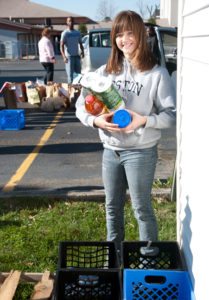For the fourth consecutive year Berea College has been selected for the President’s Higher Education Community Service Honor Roll for engaging its students, faculty and staff in meaningful service that achieves measurable results in the community. The Corporation for National and Community Service (CNCS), which has administered the honor roll since 2006, honored Berea College as a leader for supporting volunteer and service-learning activities and civic engagement.
Berea College’s President Larry Shinn said, “Throughout Berea’s history, student learning has been focused on how best our students can serve the communities where they live and work. We say that, ‘Berea seeks to educate service-oriented leaders for Appalachia and beyond.’ The inclusion of Berea College on this national honor roll of service is some indication that our mission of learning, labor and service is being accomplished.”
Since 2000, the Center for Excellence in Learning through Service (CELTS) at Berea College has housed student-led community-service programs and the academic service-learning program. Berea College students serve through volunteer and service-learning opportunities that take place in the Berea/Madison County community, in the Appalachian region and at sites throughout the United States and the world. During the 2009–10 academic year, 40 percent of Berea College students participated in service or service-learning activities, contributing more than 88,000 hours of service to the community.
CELTS is home to ten student-led community service programs, a Bonner Scholars Program and the academic Service-Learning Program. All of these programs are based on a model of leadership development that provides students with opportunities for training, mentoring fellow students and managing programs themselves. The service programs include mentoring and tutoring programs, Habitat for Humanity, an environmental advocacy program, and a program that serves the Spanish-speaking community, among others. Service-learning courses are taught in more than twenty disciplines across campus. Community partners include non-profit agencies, community-based organizations, and schools.

Lilly Belanger collects food for the Berea Community Food Bank
Structured reflection in all of the service programs provides students with opportunities to understand the connections between academic course content and community issues. “Berea College has given me a lot more direction, not only in learning about the world’s problems, because that will only get you so far, but also learning solutions and the best ways to work to solve those,” said Lilly Belanger, a peace and social justice studies major from Berea, Kentucky.
Jerry Workman, volunteer director of the Berea Community Food Bank, has seen Berea’s mission to serve benefit both the community and the students. “Working with CELTS and service programs at Berea College for over twenty years has provided the Berea Community Food Bank with great resources. I have had the opportunity to observe students become aware of the community needs and develop skills to assist these needs.”
Several other Berea College programs provide community services and outreach to the Appalachian region, including the Loyal Jones Appalachian Center, through the Brushy Fork Institute, Entrepreneurship for the Public Good, Grow Appalachia, and federally funded programs like GEAR UP, Upward Bound, Educational Talent Search, Promise Neighborhoods and others.
The Corporation for National and Community Service is a strong partner with the nation’s colleges and universities in supporting community service and service-learning. CNCS oversees the Honor Roll in collaboration with the U.S. Departments of Education and Housing and Urban Development, Campus Compact, and the American Council on Education. Honorees are chosen based on a series of selection factors, including the scope and innovation of service projects, the extent to which service-learning is embedded in the curriculum, the school’s commitment to long-term campus-community partnerships, and measurable community outcomes as a result of the service. For a full list of recipients and descriptions of their service, visit www.NationalService.gov/HonorRoll.